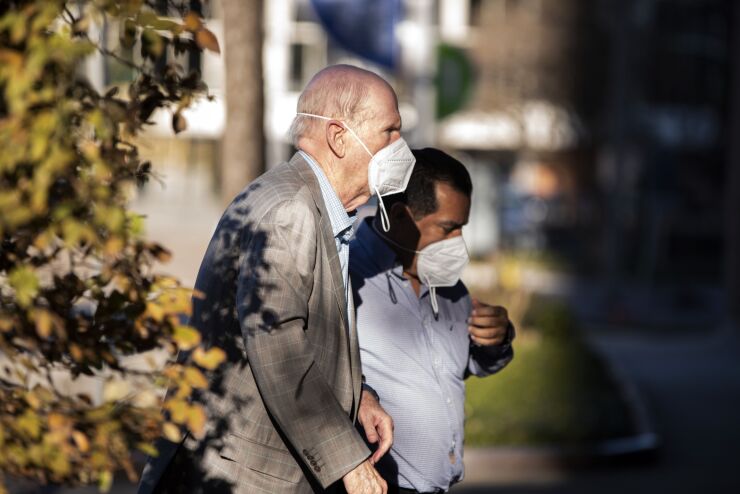The biggest tax evasion
The second effort, brought by the Internal Revenue Service, is civil rather than criminal, so has a lower burden of proof. And it’s aiming at $1.4 billion in taxes, penalties and interest dating back some two decades.
“The IRS goes after people even after they’re dead, so competency or being alive doesn’t matter,” said
Brockman, a computer whiz, amassed his fortune building Reynolds & Reynolds, a software vendor for car dealerships, into an industry giant, and investing in private equity firm Vista Equity Partners. Prosecutors allege Brockman evaded taxes on $2 billion, mostly on Vista income, while hiding it in entities that include a Bermudian trust and Swiss bank accounts. Brockman has pleaded not guilty.
Robert Smith, Vista’s billionaire founder, admitted to tax crimes in a related scheme but avoided prosecution in part by
In September, the IRS slapped
Liens also cover properties in Aspen, Colorado. The U.S. is separately trying to seize a $15 million

Collecting on claims
While the civil case poses less of a challenge to the authorities than the criminal one, it’s unclear whether the IRS will collect the $1.4 billion the government says Brockman owes.
That’s because a well-funded defendant has numerous options to fight back, according to tax attorney Bruce Zagaris, who isn’t involved in the litigation. Brockman’s legal team can contest the IRS claims in U.S. Tax Court, District Court or the Court of Federal Claims. Each has its own pros and cons, Zagaris said.
Brockman and his family already filed five lawsuits in Tax Court against the agency in 1997 and 1998. Those outcomes aren’t public, but the former manager of his Bermudian trust testified at the Houston competency hearing that the dispute intensified Brockman’s penchant for secrecy and distrust of the IRS, which he dubbed “The House.”
Zagaris said the rules of procedure and evidence in Tax Court are more truncated than in District Court, and a larger portion of cases there tend to end with settlements. In District Court and the Court of Federal Claims, taxpayers must pay the tax ahead of time and seek a refund. Zagaris said the Court of Federal Claims is often considered more favorable to taxpayers.
Any of these paths could takes years to litigate. The IRS will have to show that Brockman, and not a trustee, is the real owner of assets held through a web of companies and trusts in offshore tax havens. In an affidavit filed in a Bermuda court last December, his wife Dorothy valued holdings in a family trust at more than $7 billion. A majority stake in Dayton, Ohio-based Reynolds & Reynolds represented the largest holding.
Foreign assets
However, the U.S. doesn’t have agreements to collect assets in most offshore tax havens, including Bermuda and Switzerland.
The IRS has wide latitude to try to seize and sell Brockman’s assets in the U.S., but the real estate known to be targeted with liens so far represents just a fraction of the agency’s claims. One potential avenue for the IRS would be to go after any remaining Brockman holdings at Vista, where an entity linked to him, Bermuda-based Point Investments, was the company’s original investor and eventually provided at least $1 billion in capital, prosecutors said.
Vista proved lucrative for Point, which moved a large portion of its private equity profits offshore, according to prosecutors. In 2010, Vista transferred $799 million to accounts at Swiss bank
Mirabaud has said it was
Spokespeople for the IRS and Vista declined to comment, as did lawyers for Brockman.
Brockman, who as a chief executive aggressively bought companies and litigated disputes, spent decades building a business valued at more than $4 billion, according to court filings.
Brackney, the tax lawyer, said that the Brockman proceedings are emblematic of the difficulties that the IRS has in collecting taxes from the wealthy.
“It’s a huge amount of money,” Brackney said. “It’s almost like the higher net worth and the more complex the case, the harder it is to collect. It’s probably going to take years to figure out.”





